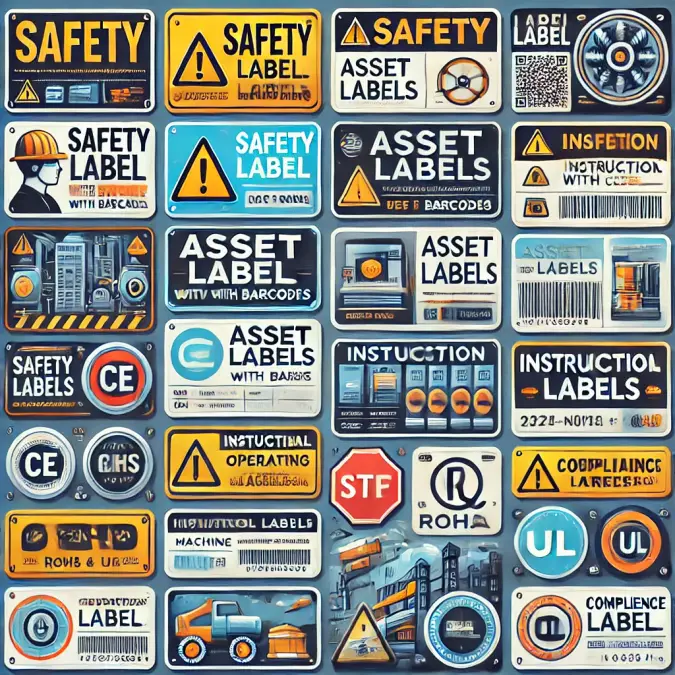Introduction to Industrial Labels: Understanding the Basics
What are Industrial Labels?
Industrial labels are specialized labels designed to withstand harsh environments and provide crucial information about industrial equipment, products, and processes. Introduction to industrial labels in various sectors is must, including manufacturing, construction, logistics, and healthcare, to ensure safety, compliance, and efficiency.

Introduction to Industrial Labels with various types
- Barcode Labels:
- Used for inventory management and tracking.
- Commonly seen in warehouses and manufacturing plants.
- Enable quick and accurate data entry using barcode scanners.
- Safety Stickers:
- Provide warnings about potential hazards.
- Include signs like “Caution,” “Warning,” and “Danger.”
- Essential for compliance with safety stickers with regulations and standards.
- Equipment Labels:
- Display information about machinery and equipment.
- Include serial numbers, model numbers, and maintenance schedules.
- Help in tracking and managing equipment.
- Asset Tags:
- Used to track and manage company assets.
- Include unique identifiers like QR codes or barcodes.
- Essential for inventory control and asset management.
- Instructional Labels:
- Provide step-by-step instructions for operating equipment.
- Include diagrams and safety instructions.
- Help in reducing errors and improving safety.
Introduction to Industrial Labels with various available material
- Polyester:
- Durable and resistant to chemicals, heat, and abrasion.
- Commonly used for asset tags and equipment labels.
- Vinyl:
- Flexible and resistant to water and chemicals.
- Used for safety labels and outdoor applications.
- Lexan:
- Strong and impact-resistant labels.
- Used for labels that require high durability.
- Paper:
- Cost-effective and suitable for short-term use.
- Commonly used for barcode labels and shipping labels.
Printing Methods used in industrial labels
- Thermal Transfer Printing:
- Uses heat to transfer ink onto the label material.
- Produces durable and high-quality prints.
- Ideal for barcode labels and asset tags.
- Direct Thermal Printing:
- Uses heat-sensitive paper to create the image.
- Suitable for short-term applications.
- Commonly used for shipping labels and receipts.
- Laser Printing:
- Uses laser technology to create high-resolution prints.
- Suitable for printing detailed graphics and text.
- Commonly used for instructional labels and safety signs.
- Inkjet Printing:
- Uses liquid ink to produce vibrant colors.
- Suitable for custom labels and small batches.
- Commonly used for product labels and promotional materials.
Introduction to Industrial Labels and its application
- Manufacturing:
- Track production processes and inventory.
- Ensure compliance with safety regulations.
- Provide information about equipment and maintenance.
- Construction:
- Mark hazardous areas and equipment.
- Provide safety instructions and warnings.
- Track tools and equipment.
- Logistics and Warehousing:
- Manage inventory and shipments.
- Track assets and equipment.
- Provide handling instructions and safety information.
- Healthcare:
- Label medical equipment and supplies.
- Provide instructions and safety information.
- Track patient records and samples.
Importance and Why introduction to Industrial Labels is must
- Safety:
- Provide crucial information in the form of safety stickers to prevent accidents and injuries.
- Ensure compliance with safety standards and regulations.
- Efficiency:
- Improve workflow by providing clear instructions and information.
- Reduce errors and downtime by ensuring proper handling and maintenance.
- Compliance:
- Ensure adherence to industry standards and regulations.
- Avoid fines and legal issues by providing necessary information.
- Asset Management:
- Track and manage assets effectively.
- Reduce losses and improve inventory control.
Introduction to Industrial labels play a vital role in ensuring safety, efficiency, and compliance in various industries. Understanding the different types, materials, and printing methods can help businesses choose the right labels for their needs. As an Organization setup with vast options and innovations Anandha Print Solutions Pvt. Ltd. is here to help you in various applications custom and tailor made.
Contact Details:
Address:
ANANDHA PRINT SOLUTIONS PVT LTD
32/2, First Floor,
Sathanipet 2nd Street,
Adj. Five Furlong Road,
Maduvinkarai, Guindy,
Chennai, Tamil Nadu,
India- 600 032.
Phone:
+91 98409 64267
Email:
info@aprints.in
sales@aprints.in
admin@aprints.in
accounts@aprints.in
design@aprints.in
Geo – Domestic State Supplies
Andhra Pradesh | Arunachal Pradesh | Assam | Bihar | Chhattisgarh | Goa | Gujarat | Haryana | Himachal Pradesh | Jharkhand | Karnataka | Kerala | Madhya Pradesh | Maharashtra | Manipur | Meghalaya | Mizoram | Nagaland | Odisha | Punjab | Rajasthan | Sikkim | Tamil Nadu | Telangana | Tripura | Uttarakhand | Uttar Pradesh | West Bengal
Geo – Domestic City Supplies
Chennai | Mumbai | Kolkatta | Delhi | Bengaluru | Hyderabad | Coimbatore | Thirchy | Madurai| Salem | Erode | Kanyakumari | Thanjavur | Tirunelveli | Vellore | Tiruppur | Kochi | Thiruvananthapuram | Kozhikode | Thrissur | Kollam | Tumkur | Mangalore | Mysore | Udupi | | Davangere | Dharwad | Hubli | Belgaum | Chitradurga | Karwar | Batkal | Visakhapatnam | Vijayawada | Nellore | Sri City (Tada) | Rajahmundry | Ongole | Tirupathi | Kakinada | Amaravathi | Guntur | Anantapur | Kadappa | Ahmedabad | Surat | Vadodra | Rajkot | Bhavnagar | Jamnagar | Jaipur | Jodhpur | Udaipur | Ajmer
International Supplies
Asia- Malaysia | Singapore | Japan | Korea | Thailand | Myanmar | Indonesia | Vietnam | Cambodia | SAARC- Srilanka | Bangladesh | Nepal | Bhutan | Afghanistan | Africa- Algeria | Ethiopia | Ghana | Nigeria | Uganda | Kenya | Tanzania | Uganda | Zambia | Zimbabwe | Egypt | Middle East- UAE | Kuwait | Qatar | Oman | Kingdom of Saudi Arabia | Bahrain | Jordan | Europe- United Kingdom | Germany | France | Switzerland | Italy | Spain | Portugal | Norway | America– United States Of – America | Canada | Mexico | Brazil | Argentina | Greenland | Other Countries – Russia | Australia






